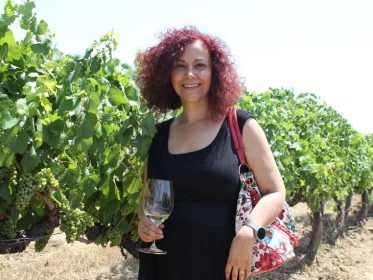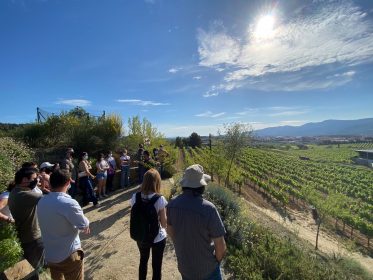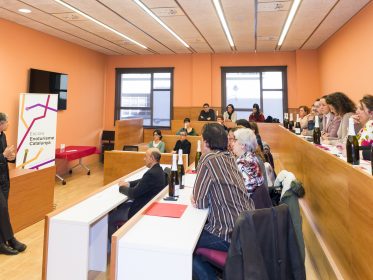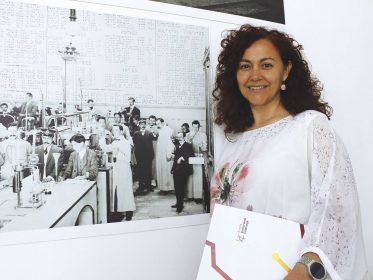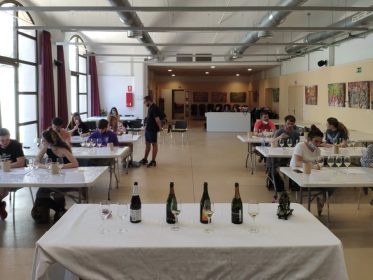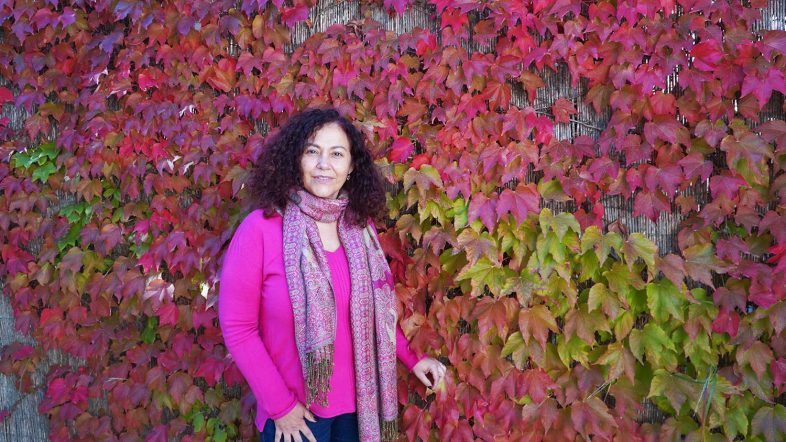Ester Garcia: The School of Wine Tourism of Catalonia
The Wine Travel Awards team continues discovering new wine tourism regions and their bright representatives. This time our journey led us to Catalonia, the place of a long winemaking tradition and kaleidoscopic variety of wine styles. And Ms. Ester Garcia, Director of The School of Wine Tourism of Catalonia, will help us to immerse ourselves in educational opportunities as well as wine tourism of this sunny region.
How did the project “L’Escola d’Enoturisme de Catalunya” come to life? How has its concept developed since the school’s establishment?
The School of Wine Tourism of Catalonia is a project promoted by the City Council of Vilafranca del Penedès. After fifteen years promoting public-private projects to support and promote the wine tourism sector of the territory, they valued it very necessary to create a specialized training center to professionalize the sector and make it more competitive.
Since 2016, almost 5000 students have passed through our training.
Who is the target audience of the school, where do its students come from (are they mainly from Catalonia)?
The Escuela d’Enoturismo is a center designed to accompany the sector in its growth, professionalize the sector and collaborate in the objective of generating a vision of Catalonia as a wine tourism destination.
The School is immersed in the sector, paired with the nine Catalan wine tourism routes, as well as with all the Denominaciones de Origen, the wine tourism employers, tourism federations, and hospitality & catering associations. Our goal is to ensure that all necessary tourism actors in any territory (wineries, accommodations, restaurants, interpretation centers, tourism promotion companies, etc.) would find in the School spaces for continuous training and improvement.
Our students are mainly people who want to develop their professional career in the field of wine tourism. They can be from unemployed ones to people who already work in the sector, as well as people who want to start their career with an official degree as Higher Technician in Tourism, specialized in Wine Tourism. This is an official qualification included in the Bologna plan of the EU and allows them to work throughout Europe.
Our student body comes 90% from Catalonia but we also have every year some students from the rest of Spain and also from other countries who can homologate their previous studies to join ours.
What courses and programs do you offer? What languages are they taught?
Every year, after identifying the needs, we develop our training plan for Wine Tourism in Catalonia. We try to pair our contents closer to the reality of each wine tourism route, respecting their training needs for the professionalization of their companies.
We carry out official courses with Certificates of professionalism from 690 to 740 hours of Travel creation and management, Promotion and Tourist information, as well as Sommelier, all of them with practices in companies. Also, we have specialized in short courses from 15 to 30 hours for professionals with useful and transferable content to business.
As a VET Institute we teach a Higher Degree Training Cycle to get the Senior Technician in Tourism degree with specialization in Wine Tourism, in which they carry out 1,000 hours of paid practices in companies.
Also, for people who already work in the sector and want to update and retrain their knowledge, every year we offer different levels of both wine tasting and pairing.
The foreign languages we teach are English and French as mandatory by curricular normative. But besides, as we know the importance that languages have for wine tourism specialization, we have training modules such as wine tasting and pairing made in English or French throughout the Higher Degree Training Cycle.
Do you follow a mostly practical approach in the educational process or is it a perfect balance between theory and practice?
From the beginning of the school the methodological approach is mainly practical, all the information and curricular contents are in the cloud, and in the classroom all the students learn by practicing, making the classroom a simulation space. In the center, we guide the growth process of the students helping them to train in those skills that the sector demands.
In addition to the practical space of the classroom, all students carry out 1,000 hours of paid practice in companies, to continue their training process from the business reality knowing the needs of the sector.
Are the visits in wineries of Catalonia part of the program?
The wineries are part of our program of visits, but beyond them the routes and the actors that make up a wine tourism territory are part of this program: accommodations, restaurants, tourism promotion companies, as well as the heritage and cultural centers to know the elements of value that make up the wine tourism product.
And why is it important for students to actually go and meet winemakers, visit their wineries and try their wine (especially when there are plenty of digital alternatives nowadays)?
In our educational project, we visit all the wine tourism routes of Catalonia, to know the wineries and main assets of each area. Besides, within the training of a Sommelier all the Catalan DO present their territory through their wines, as well as unique wineries and main products of each one.
It is very important that students learn from the experts in the sector, that they know the wines, not only from an organoleptic aspect in their final phase in the tasting, but also in the elaboration processes and the decisions they have made to get the final product.
The training in Sommellerie, as it involves tasting processes, we consider students must be present in person. Talking about a social activity of tasting among friends, we can do it online, although it is not the best option, but to train professionals in wine tasting that have to train and test their organoleptic properties through their senses, this training must be face-to-face. Besides, they also have to share elements in the process such as the temperature of the products, the conservation, the quality and typology of glasses, etc.
Ms. Garcia, you were a speaker at the Barcelona Wine Week – Hub “New communication approaches to enotourism”. What was your presentation about? What messages were important for you to deliver?
We have the challenge of moving from communication to sales in the new spaces that the Internet offers. It was also important for me to explain that communication has to LIVE a little of what they will do before arriving at wineries.
How is the wine market of your region doing at the moment?
On fire: small wineries are being created, recovering varieties of pre-phylloxera vineyards, innovating in viticulture processes, betting on methods increasingly respectful of the land and the environment, innovating in the elaboration and increasing the quality of the products. We are in a great moment for viticultural activity.
Do you think social media help develop wine tourism? There is an opinion that wineries take too much care of how their establishments will look in the tourists’ photos that the places often lose their authenticity ( barrels are arranged in perfect rows, steel tanks are perfectly cleaned, so all wineries look the same after all). Do you agree with such an observation?
I think there is a mixture between professional audiovisual resources that show a very careful image of the winery and other photographs or videos from clients where things are shown as they are in the development of the activities with the aim of generating authenticity and participating in a process like the one that is shared. So, both are important.
The Wine Travel Awards are a unified advertising and information campaign that includes offline and online events and information resources in different countries; it draws global attention to the nominees and partners operating in the field of Wine Tourism, who have been brought together in the WTA community.
Do you think such projects as the Wine Travel Awards contribute to popularization and development of wine tourism?
Undoubtedly, specialized online and offline magazines, as well as advertising companies, contribute to generate attention to wine tourism and wine sector in general, and its most iconic projects.
Author: Oleksandra Hryhorieva
Photo: laconca51.cat, lafurapenedes.cat, enoturista.cat
